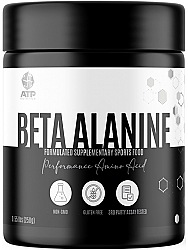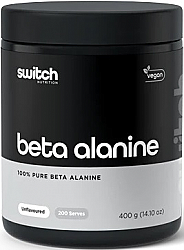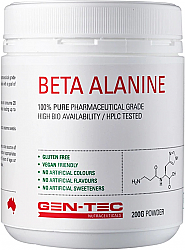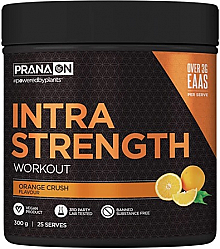Beta Alanine Supplements
-
Price 0
-
Brand 0
-
Category
- Beta Alanine (4)
- Amino Acids (40)
- BCAAs (29)
- Intra-Workouts (29)
- Essential Amino Acids (19)
- Post-Workout Recovery (15)
- Amino Acid Blends (12)
- Nitrix Oxide Supplements (12)
- Glutamine (4)
- L-Arginine (3)
- Lysine (2)
- Leucine (1)
- Optimum Nutrition (1)
- Scivation (1)
- Scivation (1)
- Tyrosine (1)
- Show more [+]
About Beta Alanine Supplements
Beta Alanine is an amino acid that supports the synthesis of a muscle-specific protein called carnosine. L-Carnosine has many uses in the body, including buffering lactic acid and antioxidant effects. Beta-alanine is referred to as a rate-limiting precursor, meaning that low beta-alanine levels typically limit the ability to produce carnosine.
Scientific research shows that beta-alanine is an effective strategy for increasing muscle carnosine levels, as indicated by research published by Amino Acids in 2007. This paper showed that beta-alanine supplementation can increase muscle carnosine levels by up to 80% after 10 weeks. The questions remains though, does this carnosine increase enhance sports and exercise performance or recovery?
Research published by Clinical science in 1993 indicated that beta alanine supplementation reduces muscle fatigue towards the end of a session. This may have occurred as a result of improved lactate buffering and an increase in myofibrillar calcium ion sensitivity.
Beta-alanine is not to be confused with alanine (L-Alanine), listed within the amino acid profile of protein powders. The alaine content of most protein powders is around 5%. This is because alanine is naturally found in a range of proteins and is used in the human body for exactly this purpose, including proteins found in muscle. However, Beta-alanine is not a proteinogenic amino acid, as it is not used for protein (muscle) building. Instead, it serves as a building block for the carnosine found in muscle, and not as a structural component of muscle.
A recent clinical study examined a 6.4 gram Beta Alanine oral dosage over 5 weeks of strength training. The doses were divided into 8 servings of 800mg to avoid any tingling side-effects. The authors concluded that supplementation, compared to placebo, led to a greater load lifted and more strength gains. This was reported in the Journal of the International Society of Sports Nutrition in 2018.
Given these physiological roles and research results, it would be fair to assume that beta-alanine supports muscle strength and endurance, delaying the onset of muscle fatigue. It has been suggested that beta-alanine supplementation offers the most benefit for exercises with repeated bouts of around 1-3 minutes, with rest periods in between.
Beta-alanine supplementation can induce a skin tingle and itch in susceptible individuals. This effect is triggered within primary sensory neurons and is not believed to be mediated by histamine. This side-effect can be reduced by decreasing the serving size and taking these smaller dosages throughout the course of the day.









